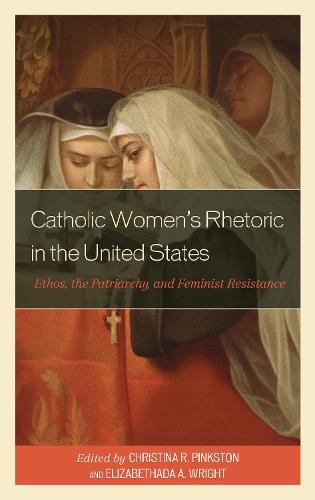
Catholic Womens Rhetoric in the United States: Ethos, the Patriarchy, and Feminist Resistance
(Hardback)
Publishing Details
Catholic Womens Rhetoric in the United States: Ethos, the Patriarchy, and Feminist Resistance
By (Author) Christina R. Pinkston
Edited by Elizabethada A. Wright
Contributions by Elizabethada A. Wright
Contributions by Amy Ferdinandt Stolley
Contributions by Christiana Ares-Christian
Contributions by Shana Scudder
Contributions by Laura J. Panning Davies
Contributions by Allison Niebauer
Contributions by Elisa Vogel
Contributions by Jamie White-Farnham
Bloomsbury Publishing PLC
Lexington Books
28th January 2022
United States
Classifications
Professional and Scholarly
Non Fiction
Feminism and feminist theory
Social groups: religious groups and communities
Roman Catholicism, Roman Catholic Church
282.0820973
Physical Properties
Hardback
334
Width 161mm, Height 228mm, Spine 27mm
703g
Description
Catholic Womens Rhetoric in the United States: Ethos, the Patriarchy, and Feminist Resistance examines the rhetoric of Roman Catholic women. Focusing on women in the United States, the books recognizes that most Catholic women have feltand been--marginalized by the Church, yet many women still seek membership in the Church because of its professed ideals. Building on various feminist theories of ethos, the authors in this collection explore how North American Catholic women from various periods, races, ethnicities, sexualities, and classes have used elements of the groups positionality to make change. The women considered in the book range from the earliest Catholic sisters who arrived in the United States to women who held the Church hierarchy accountable for the sexual abuse scandal as they redefined what it means to be a good Catholic mother. The book analyzes women such as those in an African-American order who developed an ethos that would resist racism. Chapters also consider better known Catholic women such as Dolores Huertas, Mary Daly, and Joan Chittister.
Reviews
Landmark studies do not belie this volumes thesis that the rhetorical activities of Roman Catholic women have been largely neglected: either they are voiceless nonentities under the Churchs (male) thumb; or anything interesting about their rhetoric can be isolated from their faith commitments. But here, contemporary theories of ecologically defined ethos reveal Catholic womens deployment of rich rhetorical resources in studies of womens religious orders, laywomens activism, leadership by figures such as Mary Daly and Dolores Huerta, and the dynamic public ethos of Mother Angelica and Sister Joan Chittister, among others. When the rhetorical activities of other marginalized groups have been analyzed, important insights have emerged for the entire field, not only for members of those groups, and scholars will find the same broad significance in this volume. I know I did!
-- Patricia Bizzell, College of the Holy CrossCatholic Women's Rhetoric is a groundbreaking collection exploring neglected topics in the history of rhetorical education and religious activism in the United States. These challenging essays provide significant insights into the institutional roles played by women in the public sphere, especially the accomplishments of female religious orders. As a whole, the volume demonstrates the power of feminist rhetorical scholarship to reveal the enabling conditions of historical agency for lay and religious Catholic women, the patriarchal constraints overcome, and the active resistances achieved. Scholars in all the humanistic disciplines will find this collection to be a rich resource for thinking about rhetorical practices in religious and political contexts, especially the negotiations and deployments of ethos, individual and collective.
-- Steven Mailloux, President's Professor Emeritus of Rhetoric, Loyola Marymount UniversityAuthor Bio
Elizabethada A. Wright is professor at University of Minnesota Duluth and member of the faculty at the University of Minnesota Twin Cities Literacy and Rhetorical Studies Program.
Christina R. Pinkston is assistant professor of English at Norfolk State University.
